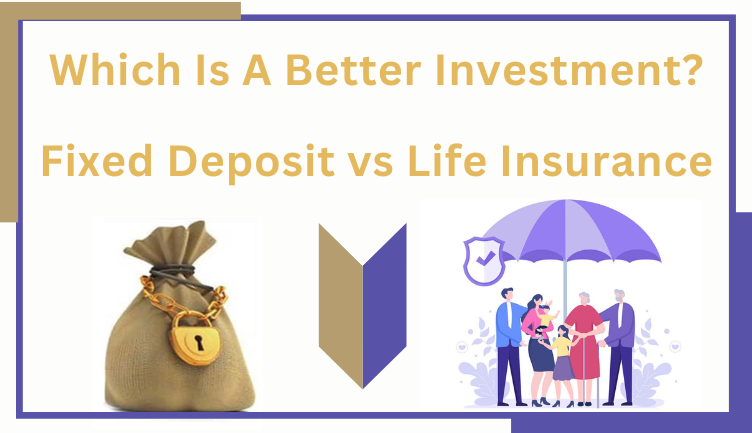Investments always bring confidence to face the future. While thinking of investing, you will find various options. Fixed deposits (FD) and life insurance (LI) both are popular to save money for the future. but the best suitability depen on your need. FD is purely an investment with banks and non-banking financing companies where you can earn attractive returns. Whereas LI is purely an insurance product to cover risks. Read on to know the suitability of each product here.
Many people are confuse about the difference between a fixed deposit and life insurance. Here is a quick breakdown of the two: A fixed deposit is a long-term investment where you give your bank or financial institution a set amount of money, say Rs 10,000. You can withdraw the entire amount at any time without incurring any penalty, but you will have to pay interest on the amount that you have deposited.
Life insurance is a policy that provides financial protection in case you die. The premiums you pay each month cover the cost of insurance premiums for a specific period of time, such as 10 years. If you die during that time, your beneficiary receives the insurance payout minus the premiums you paid. So, overall, fixed deposits are safer than life insurance because if something happens and you can’t access your money (for example, if your bank goes bankrupt), at least you’ll still be able to use your fixed deposit. Life insurance, on the other hand, can be very risky because if something happens and you don’t die immediately, your beneficiary may have to pay all of the premiums they paid upfront.
Fixed Deposit vs. Life Insurance – A Quick Comparison
Major differences are mentioned here to help gain an understanding of the uses of both financial products:
- Tenure: Life insurance (LI) policies are only long-term policies usually for 10 years that can be extended for a lifetime. whereas Fixed Deposits (FDs) are short-term investments for 1-5 years.
- Minimum investment: You can start an FD with a nominal investment of Rs 100 with a post office FD and corporate deposits starting at Rs.25,000 (which are the highest paying FDs). The minimum premium of insurance policies depends on various plans. These plans are based on your health conditions, policy terms, gender, and premium payment frequency.
- Returns: At the time of opening an FD account, you know how much will be your returns. Fixed deposits offer fixed returns whereas returns on life Insurance policies are affected by the prevailing market conditions. Insurance Plans are subject to market risk.
Reputed financial companies offer the facility of an online FD calculator for free to make interest and maturity amount calculations easy.
- Risk: We invest to protect ourselves from future risks. Once you have invested the funds in an FD, it is saved till the maturity or premature withdrawal by you. There is no worry about investing every year. There is no risk of the collapse of money. Even if you don’t want to deposit a lump sum, you have the option of investing in Flexi fixed deposits. Whereas for a life insurance plan, you have to pay the premium for the entire lock-in period, in case you forget, you will not get any returns.
- Withdrawal: Both products have the facility of withdrawal. A fixed deposit can be withdrawn on demand of the depositor at any time. whereas insurance policyholders are bound to keep the policy for a lock-in period of 3 and 5 years depending on the company’s terms.
Superior benefits of Fixed Deposits
Below mentioned are some superior benefits of FD:
- FDs are available for both- long-term periods as well as short-term periods.
- The highest paying and most credible FDs can be started with a nominal investment of Rs.25,000.
- Ensures the safety of the principal amount and assured returns on your funds.
- Easy withdrawal to meet emergency financial requirements.
- An additional source of income. You have the option to receive interest payout on your FD – monthly, quarterly, bi-monthly, or yearly.
- Great flexibility to choose tenor options ranging between 12 months to 60 months
- You can have multiple FD accounts to fulfill your different goals. Using the multi-deposit facility, you can invest in multiple FDs using a single cheque.
- With cumulative FDs, you can maximize your returns due to the compounding effect.
- Tax saver: You will not have to pay tax on interest earned on an FD if it is less than Rs.40,000 (Rs.50,000 for senior citizens) per year.
FD is an investment with banks and NBFCs. whereas life insurance is an insurance product that can be used as a risk cover. Unlike a life insurance policy, an FD plan offers some distinguished benefits. The flexibility of investment in terms of tenor options, periodic interest payouts, loan against FD, and premature withdrawal of funds is available with an FD investment. However, with a life insurance policy, you do not have the same amount of flexibility as the lock-in period of the investment ranges between 2 years to 5 years. The returns on FD are guaranteed whereas returns on life insurance policies are subject to market risks.
There is no one-size-fits-all answer to this question, as the best investment for you depends on your individual situation. However, if you are looking for a long-term solution that will provide stability and peace of mind in retirement. a fixed deposit might be a better option than life insurance. Fixed deposits typically offer higher interest rates than life insurance products, which means that over time your money will grow even faster than it would with life insurance. Additionally, fixed deposits usually have no surrender charges or early withdrawal penalties – perfect for those who want to maintain their freedom and control over their finances.

